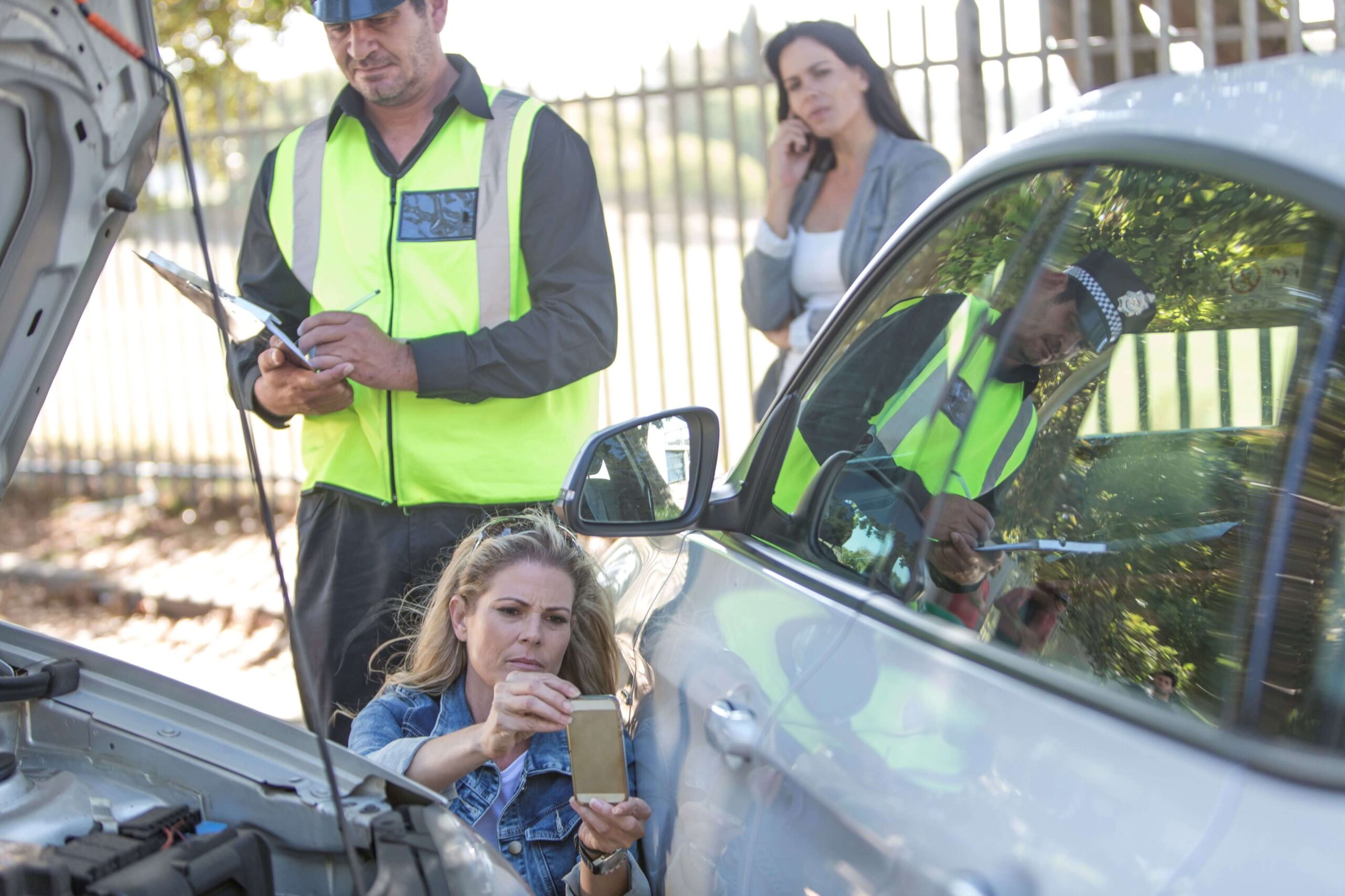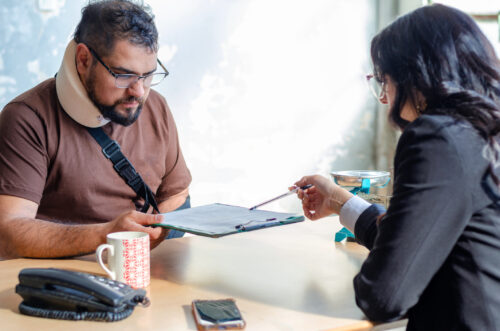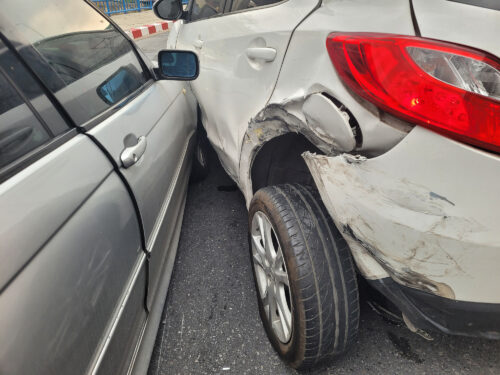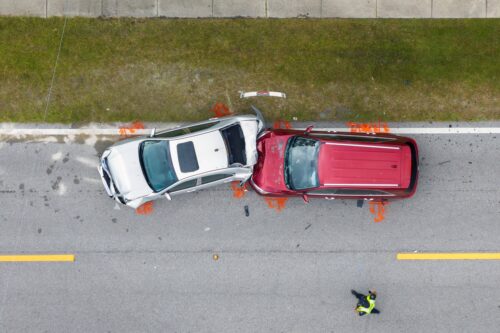
The Short Answer:
If you were involved in a car accident that you didn’t cause, you can hold the at-fault driver accountable. This is true even though Massachusetts has a no-fault auto insurance system that requires you to go through your own insurance before seeking compensation from the at-fault driver. To protect your rights, exchange information with the other driver even if you don’t plan on filing a claim. Always notify law enforcement and file an accident report. Limit communication with the insurance company. Finally, work with an attorney to determine what insurance applies and whether you have a right to sue, especially if you have more than $2,000 in medical bills.
Key Takeaways
- Even if there are no injuries, exchange information with the other driver and notify your insurance.
- Accept medical care immediately after the accident, and attend all follow-up appointments.
- In Massachusetts, you have 5 days to submit an official accident report if the collision caused injuries or property damage.
- Use care when communicating with insurance adjusters, and avoid posting about the accident on social media.
- Massachusetts has specific standards of fault that determine when a driver is presumed to be responsible for an accident.
- If you’re more than 50% at fault, you may not be able to collect compensation from the other driver.
- When in doubt, speak to an attorney before accepting a settlement offer or making a recorded statement.
Table of Contents
- What to Do After a Minor Car Accident or Fender Bender
- What to Do After an Injury Crash
- What Should I Do if There’s No Damage?
- Accident Reporting Requirements in Massachusetts
- How Is Fault Determined?
- What Insurance Coverage Is Available?
- The Dos and Don’ts After a Car Accident
- Injured in an Accident That Wasn’t Your Fault? Contact Jim Glaser Law.
What to Do After a Minor Car Accident or Fender Bender
Even a minor collision can have serious consequences. Accidents can leave you with serious bodily injuries, medical bills, costly vehicle repairs, and no way to get to and from work, assuming that you’re healthy enough to return to your job. Taking the following steps after an accident is important for protecting your rights, especially if you know that you were not at fault and did not cause the accident.
- Stop and Move to Safety: Never leave the scene of an accident. If possible, move your vehicle away from traffic. Turn on your hazard lights to alert other drivers.
- Check for Injuries: Check yourself, your passengers, and occupants of other vehicle(s).
- Call the Police: It is always a good idea to have the police respond to the scene. An official police report provides an unbiased account of the incident.
- Exchange Information: Get the driver’s insurance information, driver’s license number, and license plate.
- Document Everything: Use your phone to take photos and/or videos of the accident scene, including vehicle positions, property damage, injuries, and any other relevant details.
- Speak to Witnesses: If there were witnesses, politely ask for their names and contact information. Their statements can help support your version of events.
- Notify Insurance: Notify your insurance company and the other driver’s even if you don’t plan on filing a claim. Provide a copy of the accident report if needed.
What to Do After an Injury Crash
If the accident caused serious injuries to you, a passenger, or a pedestrian, it’s important to focus on health and safety.
- Call 911 immediately to alert police and emergency medical services.
- Do not move injured individuals. Unless they’re in immediate danger, wait for medics to arrive.
- Accept medical attention at the scene of the accident. Adrenaline can mask pain, and some serious injuries like concussions have minimal symptoms.
- Follow all medical advice, and gather documentation to prove your injury claim.
- Contact a car accident attorney for help valuing your claim and holding the at-fault driver accountable.
What Should I Do if There’s No Damage?
Even if you aren’t injured and don’t see any visible damage on your vehicle, you should still exchange insurance information as a precaution. Bumpers are designed to absorb impact without showing significant external damage, so there could be hidden structural or mechanical issues.
Additionally, soft tissue injuries that begin with soreness and stiffness can result in chronic pain. It may take weeks before you realize the full extent of your injuries. Reporting the accident, exchanging information, and notifying insurance creates a record that can be helpful in case problems arise down the line.
Accident Reporting Requirements in Massachusetts
Massachusetts has specific requirements for reporting motor vehicle accidents that are outlined in M.G.L. Chapter 90, Section 26.
- Motorists have 5 days to report an accident to the Registry of Motor Vehicles.
- The vehicle owner may be required to submit an accident report if the operator is incapacitated.
- A copy of the Motor Vehicle Crash Operator report must be submitted to local law enforcement.
- Reports are required for any crash causing an injury, death, or more than $1,000 in property damage.
- Law enforcement must accept crash reports related to hit-and-run accidents, even if there’s less than $1,000 in damage.
- Failing to report an accident can result in fines, suspended driving privileges, and other penalties.
How Is Fault Determined?
Massachusetts has a no-fault insurance system. This means that initial medical bills and lost wages are paid by your own insurance as first-party benefits. However, other insurance coverage may apply, and you may have a right to file a civil lawsuit. In these situations, insurance companies and courts use accident reports, photos, witness statements, state laws, and other evidence to assign each driver a percentage of fault.
In civil lawsuits, Massachusetts follows the doctrine of modified comparative negligence. To collect damages for pain and suffering from the other driver, you may have to show that you were less than 51% responsible for the accident. In fact, Massachusetts even has a law called the Standards of Fault that’s used to determine when a driver is presumed to be more than 50% at fault.
What Insurance Coverage Is Available?
Massachusetts’ no-fault insurance system means that multiple layers of coverage may be available depending on the extent of your injuries and property damage. Here’s how this coverage works.
Personal Injury Protection (PIP)
PIP is your first line of defense for medical bills and lost wages regardless of who was at fault.
- It pays up to $8,000 in total benefits, including $2,000 for initial medical care up to the severe injury threshold.
- After $2,000 in medical expenses, your health insurance becomes the primary payer, but PIP can still be used for co-pays and out-of-pocket expenses.
- PIP also covers up to 75% of lost wages plus a nominal amount of household services.
- PIP benefits end 2 years after the date of the accident or sooner if limits are exhausted.
Other Coverage
Massachusetts has 4 types of compulsory auto insurance, including PIP. Drivers may also elect to purchase optional coverage, such as collision and comprehensive.
- Bodily Injury to Others covers third-party medical bills, lost income, and pain and suffering. Minimum: $25,000 per person/$50,000 per accident.
- Property Damage liability covers third-party vehicle damage caused by your vehicle. Minimum: $30,000 per accident.
- Bodily Injury Caused by Uninsured Auto applies after hit-and-run accidents and collisions with uninsured drivers. Minimum: $25,000 per person/$50,000 per accident.
- Optional collision coverage pays for damage to your vehicle regardless of who was at fault.
- Beyond your own PIP coverage, you may be able to file a lawsuit or an at-fault claim against the other driver or their insurance policy if your medical bills exceed $2,000.
The Dos and Don’ts After a Car Accident
DO seek medical attention immediately.
DO call the police and file an accident report.
DO gather as much information and evidence as possible.
DO notify your own insurance company about the accident.
DO keep detailed records of all medical care and expenses.
DON’T leave the scene of the accident.
DON’T admit fault or apologize. Just saying sorry can be considered an admission of guilt even if you were not at fault.
DON’T give a recorded statement to the other driver’s insurance adjuster without speaking to an attorney.
DON’T accept any settlement offers until you understand the extent of your injuries.
DON’T post about the accident on social media. Insurance companies may use this information against you.
Injured in an Accident That Wasn’t Your Fault? Contact Jim Glaser Law.
If you’re overwhelmed by the aftermath of a car accident that wasn’t your fault, it’s understandable. While you focus on recovering, let an experienced car accident attorney handle the insurance companies and protect your legal rights.
The team at Jim Glaser Law has the knowledge and experience needed to investigate your accident, establish fault, and pursue maximum compensation. Contact our offices in Cambridge or Sharon today to schedule a free, no-obligation consultation.
















